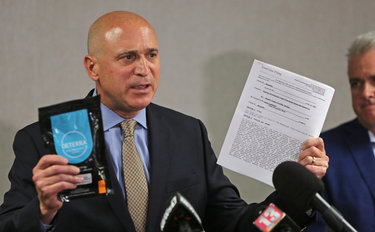New initiatives launched to quell the opioid crisis
On the same day that Menands was awarded federal funds to prevent overdose deaths, the executives for Rensselaer and Albany counties announced measures to help prevent prescription pills from being misused.
The Office of Alcoholism and Substance Abuse in Menands is being awarded $850,000 in federal funding to provide resources and training for New York’s first responders to help prevent prescription drug and opioid overdose-related deaths. The Substance Abuse and Mental Health Services Administration will be distributing the funds to 13 states across the nation that total $11 million.
Also on Friday, Steve McLaughlin, Rensselaer county executive, held a press briefing in Troy to highlight a new county law that requires pharmacies that provide opioids to also provide a drug deactivation bag with each transaction.
McLaughlin noted “a severe opioid addiction problem” both locally and nationwide and said of the new law, “We think it has the potential to be adopted statewide.”
The deactivation bag is simple to use, he said. Unused drugs are placed in the bag. “Add some water, shake it up,” said McLaughlin; it is then safe to put in a landfill.
The Rensselaer law requires that costs for the deactivation bag not be passed on to the consumer. Any offenses are to be handled by the county’s health department, coordinating with the county’s department of consumer affairs.
Albany County Executive Daniel McCoy displayed an executive order he had signed on Friday, requiring pharmacies in Albany County to provide patients getting prescribed opioids with a “personal use pharmaceutical disposal system.”
The order is to go into effect once funding from the state’s opioid litigation is available; pharmacies will not have to bear the cost of the disposal systems.
The county has been involved in several lawsuits against opioid manufacturers, which have resulted in settlements such that the county will be receiving funds for abatement services and prevention initiatives.
McCoy said he would be working with the county legislature to get the executive order made into a law.
Both McCoy and Rensselaer’s health commissioner said their counties had a handle on controlling the opioid epidemic until the COVID-19 pandemic hit in March 2020. The quarantining and isolation necessary to stem the spread of the coronavirus worsened the opioid crisis, they said.
“We were controlling it,” said McCoy. But then, from 2019 to 2020, the rate of overdose deaths in the county went up 60 percent, he said; nationally, the deaths went up 66 percent.
McCoy noted that, when teens swipe their parents’ alcohol for a party, it’s noticed but few people county their pills. “You’re not aware of it,” he said.
Flushing unused pills down the toilet or tossing them in the garbage is “not friendly to the environment,” McCoy said. If, instead, the pills are placed in a drug deactivation bag, “it’s not going to get into our waterways.”
McCoy also said that he and other county executives had met with Dennis McKenna, the president and chief executive officer of Albany Medical Center, earlier in the week to talk about opening a pain-relief clinic to address alternatives other than opioids.



